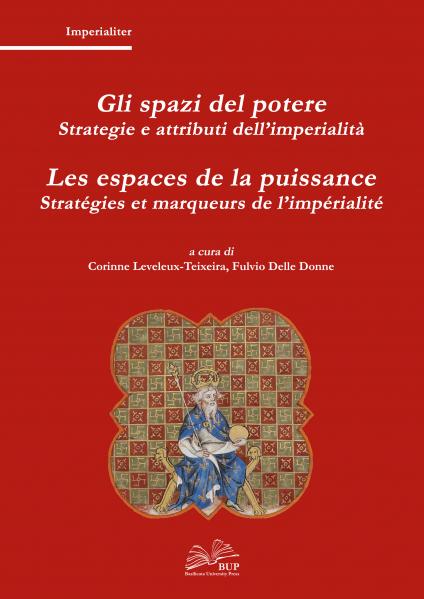BUP new website
ATTENTION PLEASE
Starting from April 16, 2025, the BUP will be accessible
HERE

Series: Imperialiter, 3
Pages: 192
Language: Italian, French, English
Published: 2023
ISBN: 978-88-31309-23-3
Abstract: Is the vastness of territory a necessary attribute of imperialism? Is an empire simply a larger kingdom? By reworking the interventions presented at the scientific conference held at Maison Française in Oxford in June 2018, this book critically examines the connections established since the Middle Ages between the concept of an empire and its geographical manifestation. Specifically, it reflects upon the relationship between imperial political rationality and territorial configuration through a selection of case studies derived from the realms of Sicily, France, Hungary, Spain, and England.
Summary
Corinne Leveleux-Teixeira, De l’espace à l’espèce : de quoi l’impérialité est-elle le nom ? Quelques réflexions introductives
Annick Peters-Custot, Le royaume normand de Sicile, cas d’école de l’impérialité royale ?
Jean-Paul Boyer, Humilier l’Empire. Le paradoxe des romanistes du royaume de Sicile-Naples (fin XIIIe-mi-XIVe siècle)
Benoît Grévin, Rex est imperator extra regnum ? Stratégies impériales françaises, des Capétiens aux premiers Valois (1212-1380)
Attila Bárány, The Medieval Kingdom of Hungary : a Power Factor in Central Europe
Hélène Sirantoine, When Being King Was Not Enough : Imperatores in Medieval Iberia (Ninth to Twelfth Century)
John Watts, Imperial England, 1150-1550
Corinne Leveleux-Teixeira is Professor of Legal History at the University of Orléans and Director of Studies at the École Pratique des Hautes Études (Paris). She also teaches at Sciences-Po Paris. Trained in history, public law and theology, she is a specialist in medieval law. She works on the relationship between knowledge, institutional structures and social practices. She is editor of the Revue historique de Droit Français et Étranger.
Fulvio Delle Donne is Professor of Medieval and Humanistic Latin Literature at the University of Basilicata. His extensive scientific production combines philological-literary and historical methods and interests, covering a wide chronological arch (VI-XVI sec). His bibliography includes many critical editions and monographic volumes for prestigious publishers and numerous articles for international scientific journals. He leads many national and international scientific projects, and is the President of the European Center for Studies on Aragonese Humanism and Renaissance - CESURA (www.cesura.info), and the Director of the connected International Interuniversity Center.


This work is licensed under a Creative Commons Attribution-NonCommercial-ShareAlike 4.0 International License.
ATTENTION PLEASE
Starting from April 16, 2025, the BUP will be accessible
HERE
